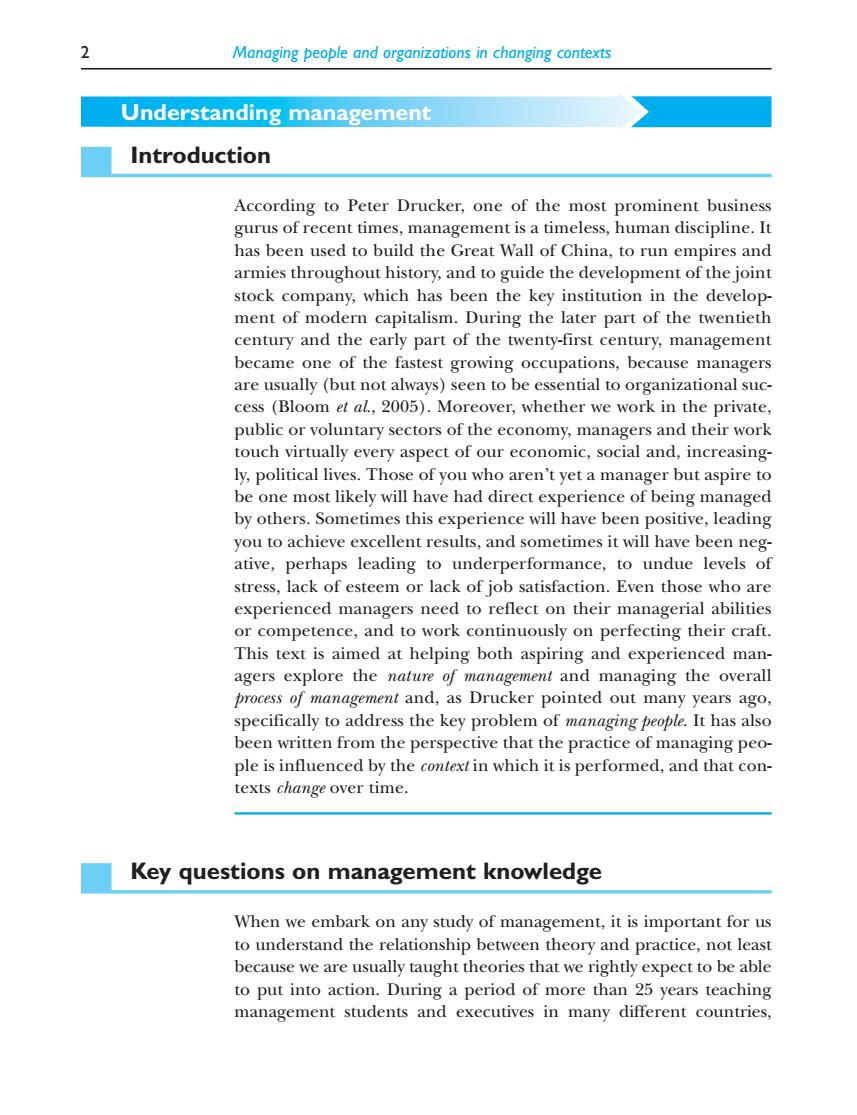正在加载图片...

Managing people and organizations in changing contexts Understanding management Introduction According to Peter Drucker,one of the most prominent business gurus of recent times,management is a timeless,human discipline.It has been used to build the Great Wall of China,to run empires and armies throughout history,and to guide the development of the join stock company,which has been the key institution in the develop- ment of modern capitalism.During the later part of the twentieth century and the early part of the twenty-first century,management became one of the fastest growing occupations.because managers are usually (but not always)seen to be esse ential to organizational suc cess (Bloom et al,2005).Moreover,whether we work in the private, public or voluntary sectors of the economy,managers and their work touch virtually every aspect of our economic,social and,increasing- ly,political lives.Those of you who aren't yet a manager but aspire to be one most likely will have had direct experience of being managed by others.Sometimes this experience will have been positive,leading you to achieve excellent results,and sometimes it will have been neg- ative,perhaps leading to underperformance,to undue levels of stress,lack of esteem or lack of job satisfaction.Even those who are experienced managers need to reflect on their managerial abilities or competence,and to work continuously on perfecting their craft. This text is aimed at helping both aspiring and experienced man- agers explore the nature of management and managing the overall process of management and,as Drucker pointed out ma ny years ago specifically to address the key problem of managing people.It has also been written from the perspective that the practice of managing peo- ple is influenced by the context in which it is performed,and that con- texts change over time. Key questions on management knowledge When we embark on any study of management,it is important for us to understand the relationship between theory and practice,not least because we are usually taught theories that we rightly expect to be able to put into action.During a period of more than 25 years teaching management students and executives in many different countries, Understanding management Introduction According to Peter Drucker, one of the most prominent business gurus of recent times, management is a timeless, human discipline. It has been used to build the Great Wall of China, to run empires and armies throughout history, and to guide the development of the joint stock company, which has been the key institution in the development of modern capitalism. During the later part of the twentieth century and the early part of the twenty-first century, management became one of the fastest growing occupations, because managers are usually (but not always) seen to be essential to organizational success (Bloom et al., 2005). Moreover, whether we work in the private, public or voluntary sectors of the economy, managers and their work touch virtually every aspect of our economic, social and, increasingly, political lives. Those of you who aren’t yet a manager but aspire to be one most likely will have had direct experience of being managed by others. Sometimes this experience will have been positive, leading you to achieve excellent results, and sometimes it will have been negative, perhaps leading to underperformance, to undue levels of stress, lack of esteem or lack of job satisfaction. Even those who are experienced managers need to reflect on their managerial abilities or competence, and to work continuously on perfecting their craft. This text is aimed at helping both aspiring and experienced managers explore the nature of management and managing the overall process of management and, as Drucker pointed out many years ago, specifically to address the key problem of managing people. It has also been written from the perspective that the practice of managing people is influenced by the context in which it is performed, and that contexts change over time. Key questions on management knowledge When we embark on any study of management, it is important for us to understand the relationship between theory and practice, not least because we are usually taught theories that we rightly expect to be able to put into action. During a period of more than 25 years teaching management students and executives in many different countries, 2 Managing people and organizations in changing contexts